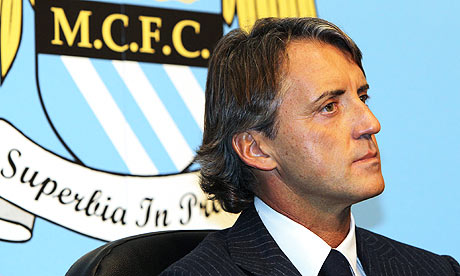Welcome to the world where managers don't manage
-

Roberto Mancini, the new Manchester City manager, has always operated under a sporting director. Photograph: Alex Livesey/Getty Images
Perhaps the time has come to stop calling them "managers". That was a title invented for the Chapmans, the Busbys, the Shanklys and the Cloughs, the kind of men who insisted on being the masters of all they surveyed. In the early days of football we exported them to continental Europe, which is why managers in Italy and Spain are still accustomed to being addressed by their players as "mister".
We can continue to reserve the title of manager for Sir Alex Ferguson and Arsène Wenger, who go about their job in a way their predecessors would recognise, and perhaps for Martin O'Neill and Roy Hodgson, too. But the abrupt removal of Mark Hughes at the weekend emphasises how the job is changing, under the influence of European practice.
Roberto Mancini, Hughes's successor, was known at Internazionale by the conventional Italian title of allenatore, or head coach. In Europe's big clubs the English manager's functions have long been divided, a general manager dealing with the owner and with contractual matters while the head coach picks the team and supervises the training sessions.
Chief executives have taken on the functions of the general manager in English clubs, but we seem to have invented a third and more ambiguous role: the director of football, who commands the owner's ear on football matters but whose lack of visibility and public accountability has created suspicion about their role.
At Eastlands there is Brian Marwood, known to fans as a moderately talented winger with Hull City, Sheffield Wednesday and Arsenal in the 1980s but appearing to owe his present role at Manchester City to a spell as a marketing manager with Nike. It was there that he encountered Garry Cook, who is now City's chief executive and is given to voicing his ambition to transform the club into "a successful business where the core competency is football".
Marwood has the title of City's "football administrator"‚ because Hughes, who is from the old school, did not like the idea of someone called the director of football hovering at his shoulder. Much good it did him. When patience ran out, the manager and his assistants paid the price while those above them remained in place. But to see that as an unqualified injustice is to ignore the history of the game as well as the facts of the specific case, such as Hughes's investment of £50m in three defenders manifestly incapable of protecting their goalkeeper, his acquisition for a combined £41m of two players whom Arsenal were clearly happy to let go, and his inability to develop a working rapport with a troublesome but gifted Brazil international of whom Sven-Goran Eriksson, when asked why his City were playing so much better than his England, said: "But with England I did not have Elano." When Hughes accepted the opportunity to rebuild the club with unlimited quantities of Arab money, he must have been aware that success had to be immediate.
"In Italy it's not only the manager who decides," Mancini said last night when asked who would be making City's future transfer deals – or, in Cook's phrase, executing their "accelerated acquisition strategy". The Italian continued: "It's the manager and the director of football. For me, that's OK. It's only important for City to win."
Mancini will certainly know how Hughes feels, for he was still in charge at Internazionale, and on his way to a third Serie A title in a row, when José Mourinho was approached to replace him two seasons ago. When Hughes was offered the City job, Eriksson was still in place. The stakes are getting higher all the time, and so are the demands, along with the rewards.
It was at his £6m mansion that Hughes convened a meeting with his assistants on Saturday night. He can expect a £3m pay-off and plenty of offers from clubs who remember the outstanding work he did on a limited budget at Blackburn Rovers. That's the way football works.